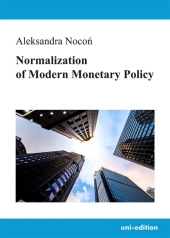 Neuerscheinungen 2018Stand: 2020-02-01 |
Schnellsuche
ISBN/Stichwort/Autor
|
Herderstraße 10
10625 Berlin
Tel.: 030 315 714 16
Fax 030 315 714 14
info@buchspektrum.de |

Aleksandra Nocon
Normalization of Modern Monetary Policy
2018. 182 S. 24.5 cm
Verlag/Jahr: UNI-EDITION 2018
ISBN: 3-947208-02-2 (3947208022)
Neue ISBN: 978-3-947208-02-9 (9783947208029)
Preis und Lieferzeit: Bitte klicken
It has been almost a decade since central banks, in the face of the global financial crisis, implemented a set of unconventional initiatives. The end of the first decade of the 21st century has started a new period in central banking - a period of non-standard and unconventional monetary policy instruments, used in unprecedented scale and scope. Monetary authorities´ action have included mainly low interest rate policy, unconventional liquidity support programs and Quantative Easing policy. It has led to a reduction of main interest rates to historically low (zero or, in some cases, even negative) levels, huge expansion of central banks´ balance sheet and changes in their communication system with stakeholders.
The book covers the issue of how to exit from non-standard policy and prepare for effective normalization process of modern monetary policy. Normalization is the process of implementation of the assumptions of exit strategies, precisely set by central banks. It is an attempt how to "exit" from non-standard monetary policy and return to pre-global financial crisis framework. In a broader perspective, it is a process related to withdrawal of unconventional instruments and stabilization of banking sector conditions. Particular attention was paid on timing, pace and sequencing of actions that should be included in the normalization process.
The Author also looks closely to the concept of "new normal", as a new post-crisis monetary architecture when central banks return to conventional monetary policy. However, will the "new normal" be the same as the "old normal"? So the same situation like before the outbreak of the global financial crisis, or it will be totally new quality in monetary policy, far from the previous paradigm of central banking. This question is a prerequisite for further considerations in this publication.


